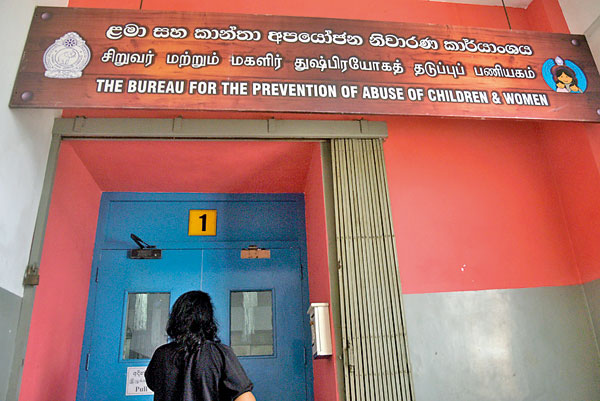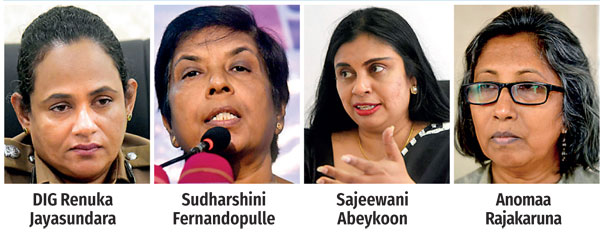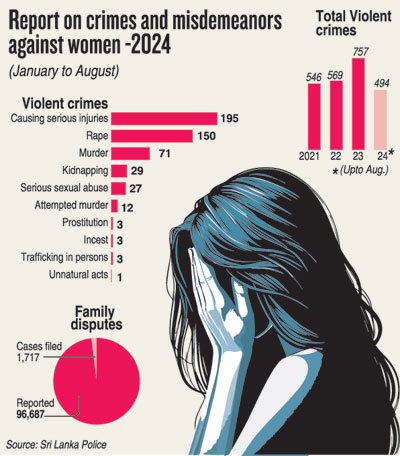News
Violence kills over 350 Lankan women in past 4 years
View(s):Most cases of domestic violence not reported to the police, even in the reported cases, few women seek protection orders against their partners due to stigma, lack of knowledge about legal protection and lack of financial independence
By Ishu Bandara
Violence, or Intimate Partner Violence (IPV), is leading to more deaths of Lankan women. Out of 350 women murdered by violence, more than 100 murdered by their husbands, partners, or former boyfriends/husbands in the past four years, according to reports from the Child & Women Bureau.
Police statistics show that the problem of violence against women has grown steadily in recent years, with 82 deaths reported in 2021, 95 in 2022, 105 in 2023 and 71 deaths up to August 2024.

Many women suffer abuse in silence and are reluctant to complain to relevant authorities. Pix by Akila Jayawardena
DIG Renuka Jayasundara of the Children and Women Bureau told the Sunday Times that the police receive nearly 130,000 reports of family disputes annually, yet only 0.3 (1%) of these cases result in a protection order, and in this year it increased to 2.3%. This lack of legal protection has, in many instances, led to the murder of women, despite Sri Lanka having strong laws under the 2005 Penal Code (No. 34).
DIG Jayasundara said in a majority of the cases women are subject to physical, sexual, and emotional abuse by their partners, with the violence taking a turn for the worse and ending with murder.
However, given societal attitudes and stigma around domestic violence, many women choose to remain silent for fear of shaming their families.
“Most cases are not reported to the police, and even in the reported cases, few women seek protection orders against their partners. Many settle the matter within the police station without a proper solution, which may ultimately lead to them becoming long-term victims of harassment, and sometimes even death,” DIG Jayasundara said.

Among the recent incidents reported was the murder of a woman by her partner while there was a protection order in place. In another case, an administrative officer was murdered by her husband while she was sleeping; he later told the media that he had seen someone inside the house.
Attorney-at-Law Sajeewani Abeykoon, Director of Law Enforcement at the National Child Protection Authority, told the Sunday Times: “We mostly hear of domestic violence-related killings, femicides, and frequent domestic abuse. Harassment can occur in public spaces, workplaces, and homes, and nowadays, there is also a lot of online harassment.”
Ms. Abeykoon said that according to the Prevention of Domestic Violence Act No. 24 of 2005, any woman facing physical or mental harassment can obtain a protection order from the Magistrate’s Court with just an affidavit, without needing to provide substantial evidence as required in other cases. Additionally, even if no violence or harassment has yet occurred, but there is a threat or fear, a woman can still obtain a protection order to prevent any future harm from the other party.
She urged every woman victim without hesitation to go to police stations or other available places to seek help, such as the Police Children and Women Bureau, the Legal Aid Commission (which offers free legal consultation), Women’s Aid, or the National Women’s Committee (Hotline: 1938).
Former parliamentarian Sudharshini Fernandopulle, who headed the Women’s Caucus in Parliament and served on the committee that resulted in the Women’s Empowerment Bill, said that there are enough laws in Sri Lanka, but implementation is the problem.
“Through the education system and within families, young children need to be taught how to respect women. If children witness harassment from adults, they may continue that cycle of harassment. Laws alone cannot bring change; the attitude of the people must change to foster respect for one another.”
She added that most women in Sri Lanka are not economically independent, which makes it difficult for them to raise their voices and often have to depend on men. “Therefore, women need to be empowered economically, and it is the responsibility of the government and the Ministry of Women’s Affairs to help women gain financial independence. This will also help prevent domestic violence. Women should know where to turn in cases of violence and also need counselling centres in police stations to provide support,” Mrs. Fernandopulle said.
Anomaa Rajakaruna, a writer, photographer, and award-winning filmmaker who focusses on real-life issues, especially those of women and children, told the Sunday Times that as a society, there is a tendency to cover up what’s happening within the family. “We never consider domestic violence a crime. Women have died in their own homes,” she said.
Ms. Rajakaruna, who played an active role in lobbying for the enactment of the Domestic Violence Act that was passed, said that even with the legislation, there has been an increase in the incidents of harassment and murder of women.
“As a society, we usually say, ‘don’t look next door. It’s their issue, not ours.’ But we have to take responsibility for everyone we know. Sometimes we’re aware there’s a situation—a case happening next door or at the workplace—where women are being abused. This kind of neglect can lead to serious violence. So, it’s crucial to act before it’s too late,” she added.

She also said that there is rarely talk about intimate partner violence.” Rape happens within marriages, within relationships, within love affairs. There’s a lot of violence in these contexts. It’s time to raise awareness and take steps to stop it,” Ms. Rajakaruna said.
DIG Jayasundara meanwhile said that there is the need to create a culture like that of foreign countries, where every woman should be aware of her rights to protect herself from harassment and stressed the importance of empowering women to seek solutions through Sri Lankan law, so they do not have to suffer or ultimately fall victim to murder by their partners or any other party.
“Sri Lanka’s laws have already been reformed regardless and without considering the women’s marital status, whether married, unmarried, or in living together or any other relationship, have the right to stand against abuse and seek justice through the courts. The reforms aim to safeguard women’s rights and ensure their safety,” she said.
She encouraged women suffering from domestic violence, harassment, and other forms of abuse to call the Police Children and Women Bureau 24-hour hotline 109, where they can seek the counsel of women staff who will listen to the issues and provide solutions.
The best way to say that you found the home of your dreams is by finding it on Hitad.lk. We have listings for apartments for sale or rent in Sri Lanka, no matter what locale you're looking for! Whether you live in Colombo, Galle, Kandy, Matara, Jaffna and more - we've got them all!

